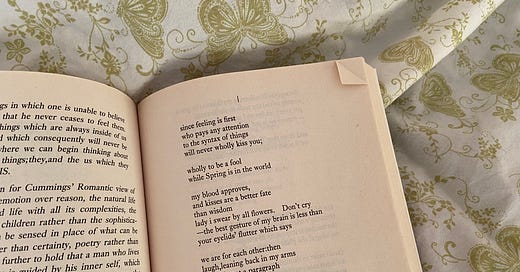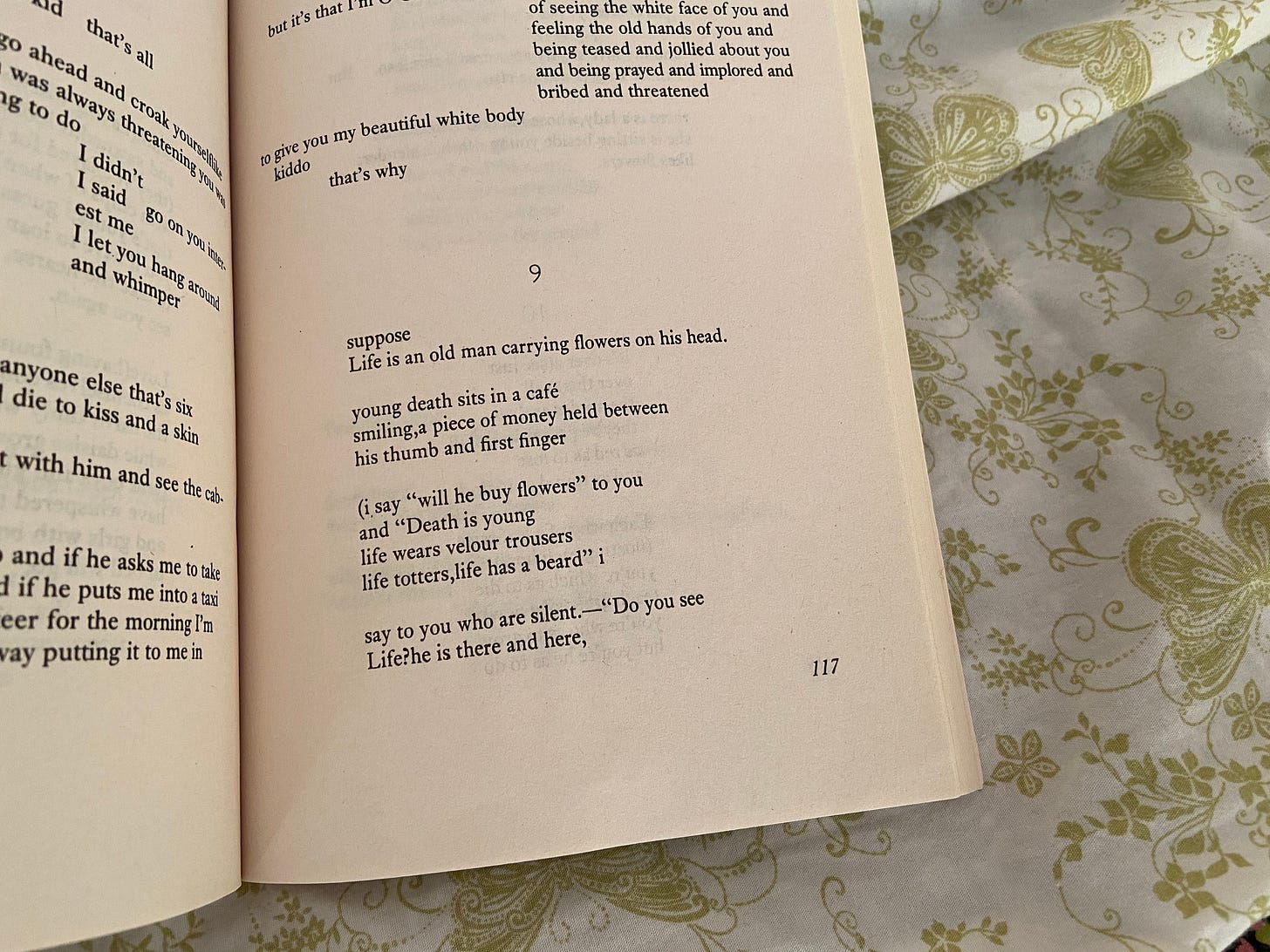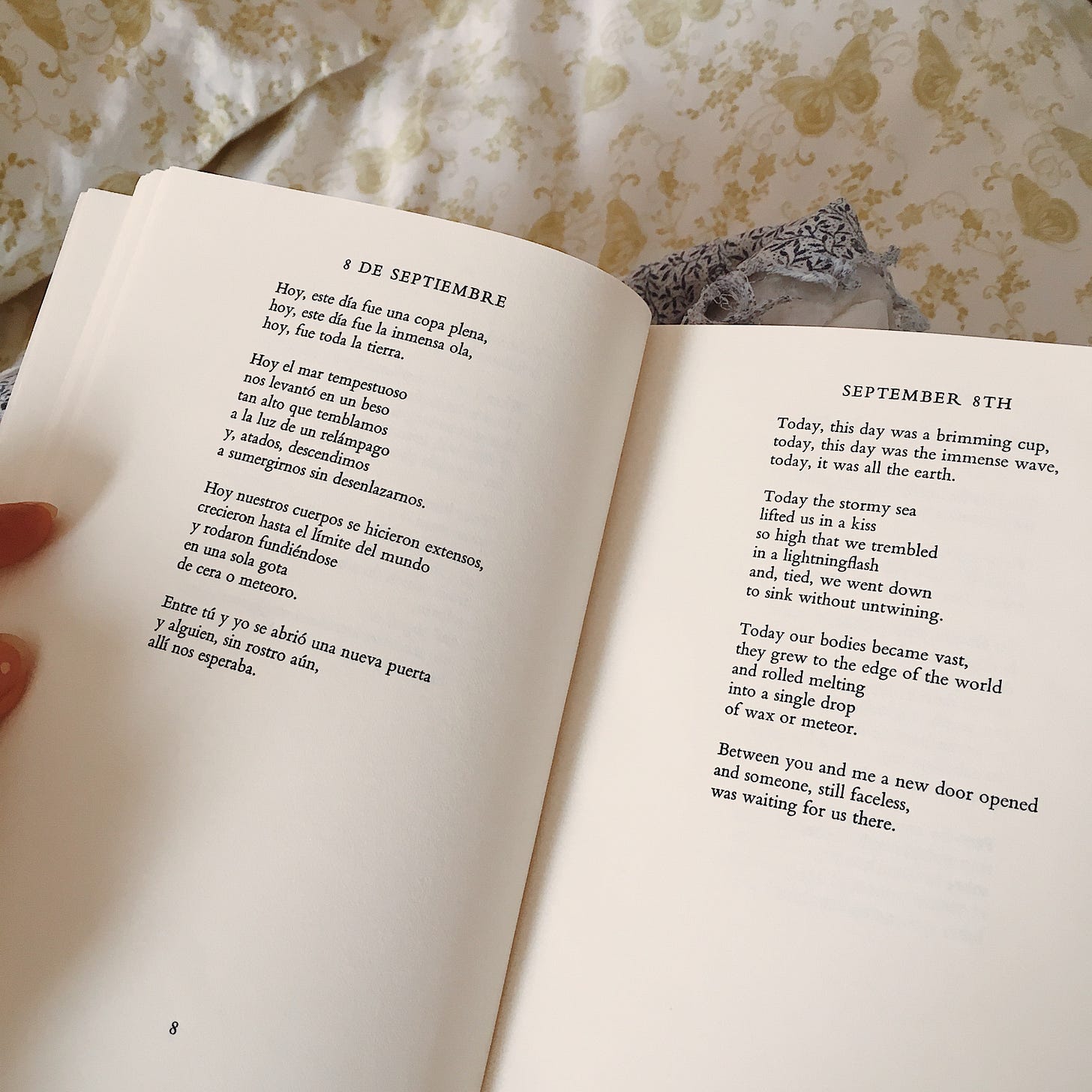April is National Poetry Month, and I’m back in my childhood bedroom which is doing all sorts of kooky nonsense to me, so you all are getting a poetry edition while I try to Ouija up my sixteen-year-old self for content!!!
Also, when I first started this Substack and originally said I would be too shy to talk about myself, apparently I lied :-) I lied in my last post too when I previously said that I would try to make my newsletters shorter, and guess what? I didn’t try at all :-) I am the biggest liar liar pants on fire one did ever see. I’m still experimenting around and trying to figure out something that feels natural on here okay!!!
Above all, I was an e. e. cummings girl, through and through. How can you read enamored shit like this and not be?
Here’s another one of his poems. It’s called “thy fingers make early flowers” (“called” is a strong word considering none of his poems have real titles, but you know). I loved it so much that I copied it onto a sheet of my special blue stationary and carried it around in my high school binder.
One last one! Indulge me!
I’m not saying that if you didn’t feel any sort of emotion while reading those, any flutter of feeling in your withered and crusty old heart, that you’re a psychopath, but just maybe don’t rule it out.
Being an adult and not living in the house I grew up in anymore is kind of cool because my old bedroom – this early sanctuary where I nested some of the most strangling feelings I have ever experienced and the scene of so much of my cognitive development, for better or for worse – has since been reduced to a kind of storage unit for this intense, emotionally charged energy that has been decaying in half-lives in my absence, leaving only harmless physical artifacts of a former time for my older self to excavate.
These relics tell me a lot about a point when I was very different from how I am now and also from how I remember myself to be. Back then, I didn’t have a clue as to how to think about myself, and so every scrap with the vaguest utility or of the loosest interest possessed indeterminable value. I feel like that age for many people is just hoarding a bunch of junk in the part of your brain dealing with emotions without a properly calibrated emotional filter. As you live your life, you eventually learn to let go of the stuff that’s not really serving you and discard the idea that sentimentality is more meaningful than it actually is.
But back then, if revisiting these poems I once loved so dearly is any indicator, I was so optimistic and hopeful! I don’t think there is anyone on Earth who would describe me as either of those now. Love sounded exhilarating and I could not wait to meet it, although it turns out I already had my hands outstretched under its current, and it let me, unbothered that I was a child who understood virtually nothing about its affairs.
You can see sprigs of this dreaminess peeking out from behind the tumbling stacks of my bookshelf and the photographs I taped all over the walls, flowers everywhere, even in my bedspread, in the backdrop for the above poems. I made my emotional landscape known to the physical realities of this room reserved entirely for me and cocooned myself within it with utter devotion.
Here is one of the photographs I referenced that’s currently on my wall. I can still see it from my bed if I turn my head to the right:
Evidently, my adolescence was an eternal springtime.
With my springtime brain, I read Kevin Prufer’s “In a Beautiful Country,” which felt warm and safe and trustworthy. I was shocked when someone told me that it isn’t actually cheerful in the slightest.
A good way to fall in love
is to turn off the headlights
and drive very fast down dark roads.
Another way to fall in love
is to say they are only mints
and swallow them with a strong drink.
Then it is autumn in the body.
Your hands are cold.
Then it is winter and we are still at war.
The gold-haired girl is singing into your ear
about how we live in a beautiful country.
Snow sifts from the clouds
into your drink. It doesn’t matter about the war.
A good way to fall in love
is to close up the garage and turn the engine on,
then down you’ll fall through lovely mists
as a body might fall early one morning
from a high window into love. Love,
the broken glass. Love, the scissors
and the water basin. A good way to fall
is with a rope to catch you.
A good way is with something to drink
to help you march forward.
The gold-haired girl says, Don’t worry
about the armies, says, We live in a time
full of love. You’re thinking about this too much.
Slow down. Nothing bad will happen.
It’s still such a beautiful poem. It sucks that falling in love sometimes be like that.
An aside:
I can’t really conceptualize how much writing I actually did before college. In my memory, it was mostly fragments of phrases I came up with and tried to build on, lists I copied and recopied for no reason that is clear to me now, and stream-of-consciousness ramblings that flipped a massive bird to ever ending a sentence. Much of what I wrote was my best approximation at strong emotions and imagery I’ve only ever encountered on a page. I have always been self-conscious about my personal voice, which is probably why I was never someone who journaled.
But this week I found short stories and personal essays and poems I don’t remember writing; a binder full of excerpted works I sent through the printer and scanner so that I could annotate them to pieces; syllabi for creative writing courses I enrolled in; tomes I collected on “how to write” and “why one writes” compiled by “real” writers, including an anthology titled The Art of the Personal Essay that’s pushing eight hundred pages, which is frankly obscene and no, I most definitely have not read all of it.
Where I stumbled in journaling and writing for myself, I often wrote letters to other people instead, even if I didn’t always send them. I took every creative writing elective available to me, imprinted on every true mentor of the arts I had, and in middle school, I used to meet with a family friend of a family friend who was involved in the literary field to write a novel (I don’t want to talk about this) every Sunday morning at the Panera Bread. My high school English teacher for two consecutive years – who was my absolute role model in how much literature he was so intimately familiar with while miraculously never making anyone feel bad for what they knew and loved – wrote this feedback on something I submitted for an assignment:
“Excellent work, Grace. Self-aware but not self-pitying … Where should we look to get you published? Hmmm…”
Writing was clearly the craft I loved but thought would be at most a hobby.
You know what else I clearly loved? Being dramatic on the gram and posting like nobody can see me, which, at the time, in 2014, was actually true–
Okay, my engine is running out of steam. Let’s wrap it up with this one:
This poem is a translated work from the Chilean poet and diplomat Pablo Neruda (“En ti la tierra”), and it absolutely torches my mind that the English translation can be so vivid and gorgeous and tender, knowing that the original Spanish would probably just drop-kick me off this plane of existence if I understood it as intuitively as I did English.
I don’t have the volume with the original Spanish with me right now, so if you do read Spanish, perhaps you might like this one:
When you are still young, when your ceiling is a literal ceiling supplied by an adult caretaker, you maintain this impression that you don’t know very much about this world to be a part of it. But poetry and literature and art in general are agnostic to their audience and how “mature” they may or may not be. That’s what makes them such powerful thresholds for young people to cross. It’s the canal through which universal pain and joy and resistance flows. It’s the warm air that defogs the condensation formed on abstractions such as patriotism, and the parallel beauty and cruelty of nature, and wanting to die because you love someone so much. There is no gatekeeper to all of that. And there is so much overlooked merit in remaining an observer until you are ready to become a participant.
When I was last living at home, a whole third of my lifetime ago, determining what I believed in and cared about was a matter entwined with existentialism, like if I couldn’t figure out what mattered to me, or if I couldn’t achieve the best possible version of myself, it didn’t really make living worthwhile. My greatest fear when I was that age was that I would have no real interests; that the cost of a sure formula was sinking into unremarkability; that I’d emerge from the kindergartener-to-dream-college-applicant pipeline thwarted on a personal level and hanging by too thin a thread to do anything about it.
I worried over nothing. There is so much that interested me, so much that interests me still. The things I’ve cared about have only deepened; the things I believed uncertainly before are now certain. I feel like a ship righting itself in a maelstrom. I think my sixteen-year-old self would be incredibly relieved to learn how I’ve turned out.










Wow not me hitting 'publish' and then listening to a podcast where Samin Nosrat describes being uplifted by her high school English teacher 😌